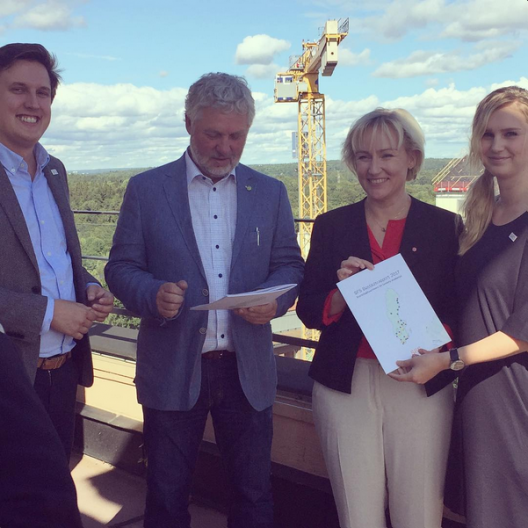Yesterday, SFS released its annual housing report. The results show an even more fragmented housing market for students. Both the green list and the red list grew this year. We also show that three quarters of Sweden's campus students are in red-listed cities. This means that a majority of Sweden's students face an uncertain housing situation when they start.
As a lucky coincidence, the government also held a press conference regarding housing construction yesterday. During the press conference, Minister of Housing Peter Eriksson, Minister of Higher Education, Research and Space Helene Hellmark Knutsson and Kerstin Lindberg Göransson, CEO of Akademiska Hus, presented concrete initiatives. The investments this time were based on Akademiska hus' assignment from 2015 to build and manage student housing.
In view of the housing situation presented in this year's housing report, it is gratifying to hear that Akademiska hus will enable the construction of 18000 homes over the next four years. Of these, 11 are student housing and 000 are built by Akademiska hus themselves. An additional 6 homes are planned for the years 400-10. Admittedly, some construction projects have previously been known, but now an overall picture of the housing that Akademiska hus will enable is presented.
The impact of academic buildings on the higher education sector is both tangible and debated. Since 2013, Akademiska Hus has been commissioned to conduct its business on a commercial basis and generate market returns. An assignment that is seen by many as contributing to the higher education institutions' resources being eroded. This raises concerns that an assignment for the construction of student housing puts a market focus ahead of the students' best interests. During the press conference, we asked from SFS about the handling of the fact that students are a heterogeneous group with very different needs. Academic houses responded in a way that gave a sense of understanding that different types of housing need to be built. They also seem to take into account that rents must be kept down to be reasonable for students.
Our hopes are that Akademiska hus takes responsibility and builds housing based on students' conditions. Academic houses are well placed to build housing at reasonable rents that are available to a heterogeneous student group. Land prices are one of many reasons why rents are high in many places today. Our hope is that Akademiska hus can contribute its current land to other actors in a way that makes the rents reasonable based on the students' situation.
However, the long-term solution cannot be that new student housing is financed with the profits Akademiska hus receives when they rent out to the higher education institutions. Appropriations for higher education have already been eroded, and building student housing with the help of profits from the sector risks putting students' conditions for studying in opposition to the academy's conditions for delivering high-quality education. The housing situation for students is unsustainable. The underfunding of higher education is unsustainable. The problems need to be solved, not set against each other.
Finally, it is important to point out that the housing shortage for students is a national problem. Our report shows that the housing shortage is not limited to a certain type of city but affects all types of cities. Akademiska hus is found as a player in only 16 of Sweden's college and university cities, which means that investments must also be made in other cities.
Maybe there is still a little light at the end of the tunnel when it comes to students' housing situation? We hope cautiously, but are convinced that the situation requires many more efforts than today.
Picture from the press conference.
